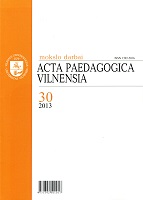TARPTAUTIŠKUMO POLITIKOS IŠŠŪKIAI LIETUVOS AUKŠTAJAM MOKSLUI: KONKURENCIJA VS BENDRADARBIAVIMAS
INTERNATIONALISATION POLICY CHALLENGES TO LITHUANIAN HIGHER EDUCATION: COMPETITION VS. COOPERATION
Author(s): Tatjana BulajevaSubject(s): Essay|Book Review |Scientific Life
Published by: Vilniaus Universiteto Leidykla
Keywords: tarptautiškumas1; globalizacija2; nacionalinė aukštojo mokslo politika3; tarptautinis bendradarbiavimas4;
Summary/Abstract: The internationalization of higher education is not a new phenomenon. Its processes and developments are often treated as responses to globalization, and they are in the focus of attention of politicians and researchers. The aim of the paper is to analyse the internationalization challenges faced by the Lithu¬anian higher education. The higher education today cannot be viewed only in the national context. Since the restitution of independence, higher education and education in general have been considered to be a mainly national affair aimed at strengthening national culture and statehood. Under the impact of globalization and within the context of the European and global internationalization policy tendencies, the relationship between internationalization policy at an international (the EUand the Bologna process) level and a national higher education policy level is changing. The analysis of international developments shows that, besides student mobility, there appear new forms of internationalization: study programme mobility and institution mobility. There can be seen two paradigms in internationalization: competition and cooperation. On the one hand, the approach to internationalization in Anglo-Saxon countries shows that they follow a competitive policy trend,in which economic rationale increasingly becomes more important, and actually win the competition for providing educational services to foreign students. The cross-border higher education in Australia, New Zealand, for instance, represents an important source of export and profit. On the other hand, the EUand Bologna process promote the development of international cooperation and interculturalism. For the Lithuanian HEpolicy, both trends are real challenges difficult to follow. The policy of ethnocentrism set as a priorityis contrasting with the EUrecommended policy of internationalization. Lithuania’s national Programme for the Promotion of Internationalisation in Higher Education, developed for 2008–2010, had as its main aim to improve quality and competitiveness. In the follow-up Programme, developed for 2011–2012,particular attention was given to cooperation through the promotion of Lithuanian and Baltic studies in foreign countries. In this way, the internationalization policy follows the EU-recommended trend and at the same time is used to strengthen the Lithuanian state and promotenational culture. Key words: internationalization, globaliza¬tion, national higher education policy, international cooperation.
Journal: Acta Paedagogica Vilnensia
- Issue Year: 2013
- Issue No: 30
- Page Range: 104-113
- Page Count: 10
- Language: Lithuanian

